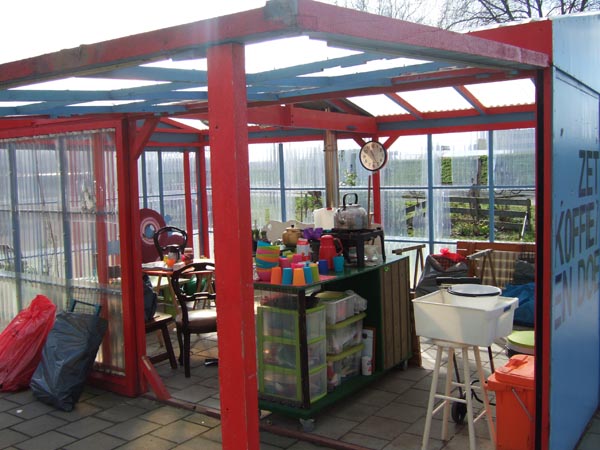Als ik interviews van mezelf teruglees, denk ik vaak; dat is kort door de bocht...
Caroline Bos heeft mij dit voorjaar geinterviewd en ze heeft het hele interview in het Engels vertaald.
Interview with Rini Biemans, Creatief Beheer
12/6/2008 by Carloline Bos
On this rainy Thursday morning the Proefpark is deserted. Rini arrives on his bike. He has just had a clash with the council (Deelgemeente) which has brought down his budget from 70,000 to 40,000 and he needs to make a call on his mobile phone. (Later it will transpire that this is a misunderstanding and the problem is resolved within a few days). We settle in the blue and red greenhouse, where Rini proceeds to make filter coffee with an enormous kettle on a gas fire. The small space is playfully and cozily furnished with junk and shelves stacked with little plants.
The Proefpark was started in September 2004 as an experiment with community self-management. The park is temporarily located on a fallow plot of land of 8,000 m² alongside a newly constructed row of houses. The nearly completed Moroccan-themed housing project Le Medi is situated next to this, and on the opposite side the Dakpark will be built. The Proefpark will eventually have to make place for houses but the local housing market, apart from le Medi, does not do well, so the park might stay longer. De Werkplaats, the bureau that organizes the residents´ participation in the Dakpark was interested in the Proefpark as a pilot for self-management of the public space by the local community. The concept of the Proefpark is that it develops gradually over time; anyone can join in. The system is open. The community itself does all maintenance, management and design.
Being an exercise in organic development, the park has a disordered appearance. Dotted around the space are various objects and structures, which have been constructed by inhabitants and volunteers. Besides the greenhouse, there is a henhouse, a rather large dovecot, a multifunctional pavilion named the Euroloket, and a builders´ shed where the equipment and building materials are kept. The most recent acquisition is a car, which has been turned into a play object by young people from the Rebound Center. A small row of neatly tended and precisely bordered little kitchen gardens is situated opposite the houses. At the center of the park are some patches of ecological planting and wildflowers. Children can gain pocket money by helping with the garden; girls use the greenhouse as a play kitchen. In the evenings the park studded with people, chatting and relaxing at the end of the day. Thus, the Proefpark works as a place where many different people can claim a little space for individual or collective activities and children can experience some sense of freedom and running wild that they normally never find inside the city.
Rini Biemans is a cultural entrepreneur. He has a network of companies, such as Creatief Beheer, Antenne Net TV, Urban Country Club, Camping Rotterdam, and projects, such as the successful Zomerfestival and the Starship Enterprise, which is dedicated to providing internships for young people in deprived inner city neighbourhoods. His annual turnover is 400,000 Euro. He works with his wife, Karin Keizer, an artist. The car was her idea. Rini himself has been a medical doctor and an artist, before turning activist-entrepreneur. He has a talk show on the local TV Rijnmond and produces two hours of television weekly. All his activities are published on his vast website antennerotterdam.nl.
Rini strongly believes in taking action. He is exasperated by the council and its many projects, which lack an underlying integral vision, and by researchers who produce reports that remain unread, instead of simply doing something. The way to go, as Rini sees it, is to just do it and get on by fighting your way forward. Yet, he knows that as an external developer he must try to remain on a friendly footing with everyone to maintain his network, but these are often people who are stuck in a hopeless system. The various partners Rini works with include Com.Wonen and Vestia (two housing corporations), the council (Deelgemeente Delfshaven) and community work (Delphi Opbouwwerk) It can be tough to continuously try to persuade people to contribute, struggling to raise money and permissions.
The traditional system of participation, which means attending a meeting, must be abolished; a more natural, normal system as deployed in villages and by tribes, where people can engage from the street, should replace this. The Proefpark.does that: intercultural misunderstandings drop away in the garden. But projects such as the Proefpark may not get the chance to become sustainable; there is a risk of such a project being built up and then abandoned again as the attention shifts to other projects.

